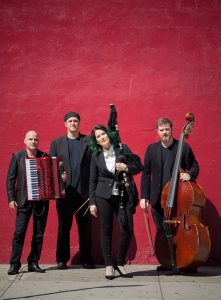
Cristina Pato has many different roles: New York University educator, composer, pianist and writer. But at Chautauqua Institution, she is best known for one role in particular: Galician bagpipe master.
Pato, who first visited Chautauqua in 2018 as part of Silkroad Ensemble, will perform with her quartet today and Tuesday with two programs based around intercultural conversations.
The Cristina Pato Quartet will perform “Migrations” at 4 p.m. Monday, June 24, in Elizabeth S. Lenna Hall as part of the Chautauqua Chamber Music Guest Artist Series. Seats are first come and require a free ticket, which can be picked up starting at 7 a.m. today at the Welcome Center Ticket Office. The quartet will perform “Latina” at 8:15 p.m. Tuesday in the Amphitheater.
Pato is one of the world’s most renowned gaita players. In 1999, she became the first female gaita player to release a solo album, and she has continued developing her art as both a soloist and an ensemble member ever since.
While the gaita is a traditional instrument of her home region in Galicia, Spain, Pato’s performances incorporate elements from folk to jazz. Pato said her music begins with Galicia but incorporates elements from vastly different cultures.
“It will be a combination between Galician mediums and jazz mediums — a conversation of many different places,” Pato said. “Although I was trained in the Galician tradition, what I do onstage is now connected to my multi-cultural journey.”
That journey includes three other quartet members with their own voices, instruments and backgrounds: accordionist Julien Labro, bassist Edward Perez and drummer Mauricio Zottarelli.
The quartet members’ voices blend together in “Migrations” — an examination of how their individual journeys collide, Pato said.
“The four of us are coming from different backgrounds and different migratory journeys to meet in New York,” Pato said. “The program will travel the different ways of understanding the music of each of my quartet players.”
The members are trained in separate traditions, and Pato aims to bridge the unique musical languages. Together, she said, the whole music experience is greater than the sum of its parts.
“I am the one making the bridge between the other languages that I speak, from classical to folkloric music to their language,” Pato said. “And somehow we tried to create something that is unique, but is also connected to all the places that we come from.”
Last season, Pato performed both as part of the Silkroad Ensemble and as a soloist with the Chautauqua Symphony Orchestra. Silkroad, which was founded in 2000 by renowned cellist Yo-Yo Ma, is a music group that promotes collaboration among diverse musicians. This year, she returns as part of her quartet to share a program of their own making — a narrowing-in of storytelling, from a full ensemble to just the four members of Pato’s quartet.
To Deborah Sunya Moore, vice president of performing and visual arts, Pato exemplifies Silkroad’s message.
“This woman who plays Galician bagpipes, who plays piano, who is a jazz musician, who is a classical musician, who is lifting up and sharing music from her own culture — I thought that’s truly what Silkroad is about,” Moore said.
But, Moore added, Pato’s strong individual voice helped bring her back to Chautauqua for another two performances.
“She was such an engaging artist and person that I wanted to bring her back this year to focus on a program that she wanted to present,” Moore said.




